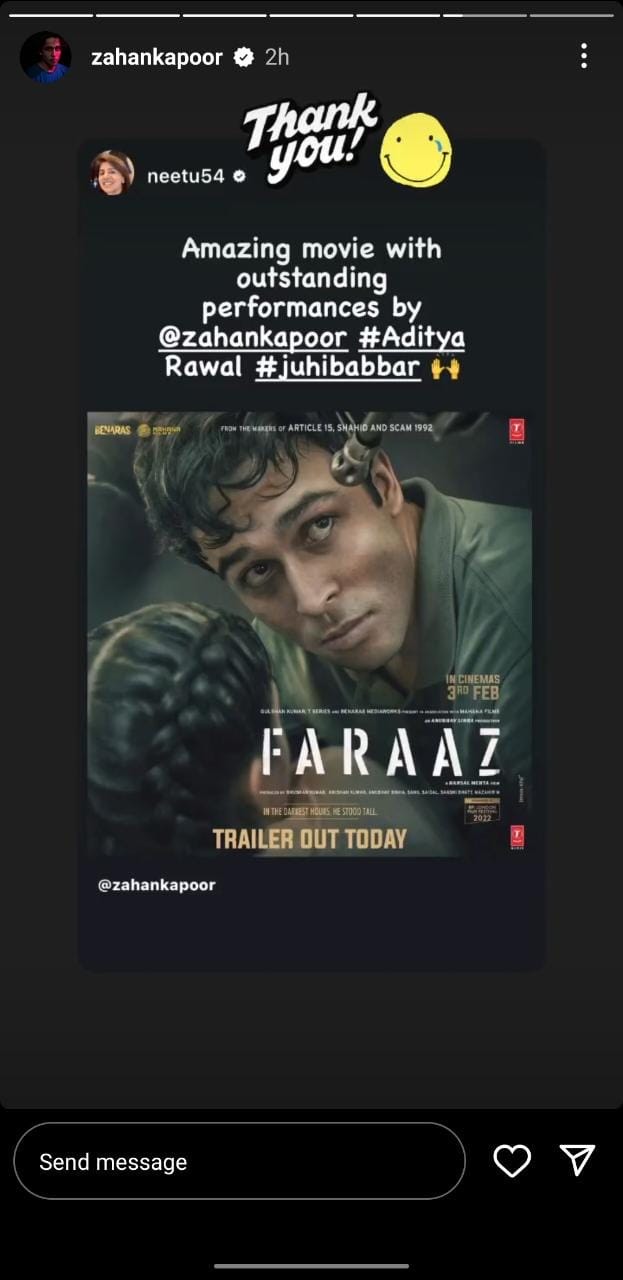
Faraaz
Hansal, Faraaz is your fifteenth directorial venture. How does it feel to have come so far with so many milestones behind you?
I don’t count my films. Genuinely. Every film is a new beginning. Every film has its share of uncertainty and nerves. Perhaps it is also because of the choices I make. There is no scope for either complacency or me carrying a false sense of security. I’m not complaining,though. Living life on the edge keeps me going.
I consider Faraaz to be a part of your great trilogy on the dynamics of terrorism, after Shahid and Omerta…where do you see Faraaz positioned in your creative ambit?
Thank you , Subhash.Faraaz is a film I’m very, very proud of. It was a challenge to pull off, a tough journey but creatively a very satisfying one. As Rajkummar Rao told me after watching the film , the Trilogy is complete now. Time to explore new stories and new characters. And finish post-production for all the exciting things that we shot for over the past eighteen months.
Out of curiosity which of your films have given you the most creative satisfaction?
Almost every film Shahid onwards has been immensely satisfying , both in terms of process and the outcome. Save a couple that I need not name. But even those I own for all their flaws, failures, deficiencies and redeeming qualities. But Faraaz has been a great process. I’ve made so many new friends in this journey and found some of the most exciting colleagues that I’m proud to introduce through the film. Writers Raghav Kakkar and Kashyap Kapoor (who co-wrote the film with Ritesh Shah), Cinematographer Pratham Mehta, Sound Designer Mandar Kulkarni, Editor Amitesh Mukherjee, co-producers Sahil, Maz and Sakshi – all of whom have given their blood and sweat to make this film happen. And of course Anubhav Sinha one of my oldest friends in the industry who backed me in telling this story just the way I wanted it. So yes, Faraaz has been satisfying and also filled me with a deep sense of gratitude. I must have done something right, no?
Of course. Faraaz has a lot of young new actors in it. Tell me about the process of casting in this film? It couldn’t have been easy since there are dozens of faces?
That was the challenge and the joy of making this film. I worked on the story during Chhalaang and I always knew that it would be a return to my indie roots for Faraaz. The film had to be made. And it needed fresh faces, bereft of image or trappings of stardom. A huge credit to Mukesh Chhabra who has a huge role to play in my filmography since Shahid. We constantly challenge each other and never ever give up. Casting is a process I really enjoy and finding the right talent to bring characters alive is something I thrive upon. Faraaz has an amazing ensemble. Right from Aditya Rawal , Zahan Kapoor, Juhi Babbar to every small character in the film including the officers, parents and the hostages this one is a triumph of honest casting , casting without an eye on profits, simply in service of the film, of the character.
Faraaz is about a terror attack in Bangladesh?how do you respond to those who want to know, why Bangladesh?
In our research of this dastardly attack we realised that here was a story that had a larger message and something very universal to share. Misguided youth taking up violence in the name of religion or a parent’s love for her child or the unexpected bravery from an unlikely hero are themes that cannot be limited by borders, nationality or language. These stories must be told. They must transcend the limitations of perceived local relevance – particularly when our polarised times need such stories to be told to a larger audience.
In 2020, your OTT series Scam 1992 proved to b e game changer. Do you see Scam as a turning point in your career?
I see Scam 1992 as an enabler. We did not expect its humongous success and to say it did not change things would be fake humility. It gave me back a lot of things I had lost in the years before it released. Including some money. And the courage to tell the stories I desperately wanted to. Also exceptional friends and collaborators like Sameer Nair and his Studio Applause.
Your films and your attitude to cinema has always been fearless. How do you cope with the threat of growing intolerance in our society vis a vis your convictions as a filmmaker?
It is not new to me. Remember Dil Pe Mat Le Yaar in 2000? The only difference now is that then I was deeply affected by the intolerance to a point of self destruction. Now I channelise my despair and anger into telling relevant stories and through them taking on those who have made it a business to be intolerant.
I can’t deny Aamir is one of the most adventurous performers in India. Aamir has constantly taken risks, gone against the… Read More
Aamir Khan’s 60th birthday has his dost-voice Udit Narayan exceptionally revved up. “We started at… Read More
Ajith’s Vidaamuyarchi Creates Suspenseful Strife On A Missing Wife Rating: ** Ajith Kumar who loves racing… Read More
Sohum Shah’s Crazxy Is What A Thriller Should Be(But Seldom Is) By Subhash K Jha Rating: *** ½… Read More
Bhumi Pednekar completed ten years in the movie industry on February 28. She made her … Read More
This Day That Year: Subhash K Jha Celebrates 28 Years Of Sridevi’s Finest Performance In… Read More
Leave a Comment